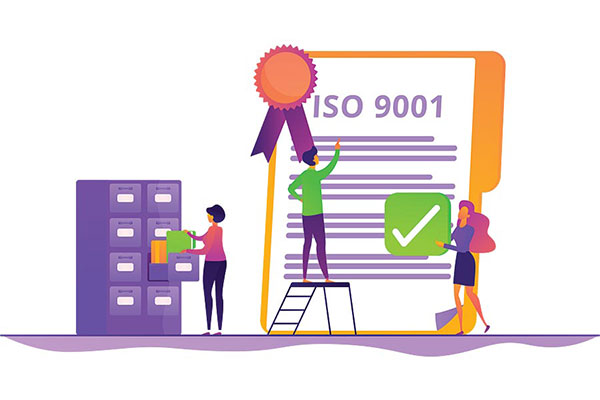The ISO 9001 standard is built on seven quality management principles: customer focus, leadership, engagement of people, process approach, improvement, evidence-based decision making, and relationship management. In this article, we provide you with a complete description of the benefits of using ISO 9001. Stay tuned to Edara systems.
While the ISO 9001 standard is universal and transcends the boundaries of industry, it seems to be a particularly good fit for the construction industry. Because construction is one of the most lucrative and competitive industries in the world, contractors must run a tight ship if they are to stand a chance against the competition when bidding on projects. One that is proactive about quality, and flexible enough to adapt to ever evolving industry demands.
The complexity of construction projects, the high risk, and the great number of nuts and bolts involved requires construction companies to have an effective QMS to be successful. In addition to the general advantages certifying against the ISO 9001 standard offers, there are also tremendous benefits for construction industry employees at all levels of the organisation. This article examines the impact ISO 9001 has on both management and employees and describes the benefits it presents for each. Also, if you are looking for more information about ISO 9001 cost, we have prepared complete information on ISO 9001 certification cost for you.
Leadership and commitment procedure (Management) in ISO 9001
Formerly called Management Commitment, the Leadership and Commitment requirement has for objective to ensure that all members of the management team are actively cultivating a culture of quality and holding themselves accountable for the effectiveness of their QMS. The leadership and commitment clause offers guidance that, when implemented effectively, immensely benefits management because it creates:
1-More engaged leaders, first benefits of ISO 9001 for employees
The ISO 9001 standard requires that management take ownership of their role as such by gaining a firm understanding the context of the organisation to ensure that the objectives of the policies and procedures of the QMS are in line with the strategic direction of the organisation. Before management can demonstrate leadership, they must first take ownership.

2-Smarter leaders, risk-based thinking and corrective actions, reason for implementing QMS
An important part of management demonstrating commitment and leadership under the ISO 9001 standard is that they are taught to employ risk-based thinking. By looking at the context of the organisation, management must identify the risks and opportunities in their organisation, analyse and evaluate them, then implement corrective actions.
3-Better leaders, ‘hands-on’ approach to the management with the ISO 9001
Management’s active role in the management of the QMS goes far beyond their own accountability. They must empower their employees by providing them with clearly defined quality metrics, and hold them accountable for reporting on the performance and opportunities for improvement of the QMS within their respective areas of responsibility.

4-Engagement of employees, another important ISO 9001 defining principle
Engagement of people is another important ISO 9001 defining principle. It states that employees are more likely to deliver value to clients and stakeholders when they are competent, empowered, more engaged, and when they feel safe. In other words, happier employees, make better employees. If you want more information please see What are the benefits of ISO 9001 in Edarasystems.
You might think this is pure common sense. However, certain things are easier said than done. Which is why the ISO 9001 standard provides managers with clear guidance on how to get the best quality results out of their employees while keeping them happy. Some of suggestions ISO 9001 offers on keeping employees engaged are as follow.
Nine suggest for engaged your employees with implementing ISO 9001
Motivated managers: the mindset, ideas and actions of managers will influence those of employees. Keep your managers curious, involved and motivated to see that reflected on the rest of the organisation.
Set the right expectations: employees who know exactly what is expected of them feel supported by their superiors and are more prone to taking on new challenges.
Involve them: employees are more inclined to take initiative when they feel trusted. Involving them in matters that are beyond the scope of their responsibilities will make them feel trusted.

Recognise their contributions: recognise and appreciate your employees’ contributions and efforts. Recognition makes employees feel satisfied with their work and makes them more productive.
Collaboration: cultivate a climate of cross-departmental collaboration to show that you value each team’s knowledge and expertise. This will encourage employees to seek out help from other departments more frequently, eliminating the feeling of isolation.
Support: employees are only as good as the support and tools they are given. Support your employees with sufficient training and equip them with the right tools for success.
Feedback: adopt an open-door policy and be open to employee feedback. After all, who would know the underlying issues on the ground better than the ones in the front line?
Opportunities for advancement: employees are more engaged and perform better when they know that their efforts will be rewarded through career progression opportunities. Promote from within where possible and invest in existing talent to show your employees you care about their future.
Make your employees feel safe: when sharp focus is placed on quality, positive repercussions reverberate throughout the entire organisation. This includes the quality of the work processes used to deliver goods and services. Quality processes are safer processes.


Your Comment